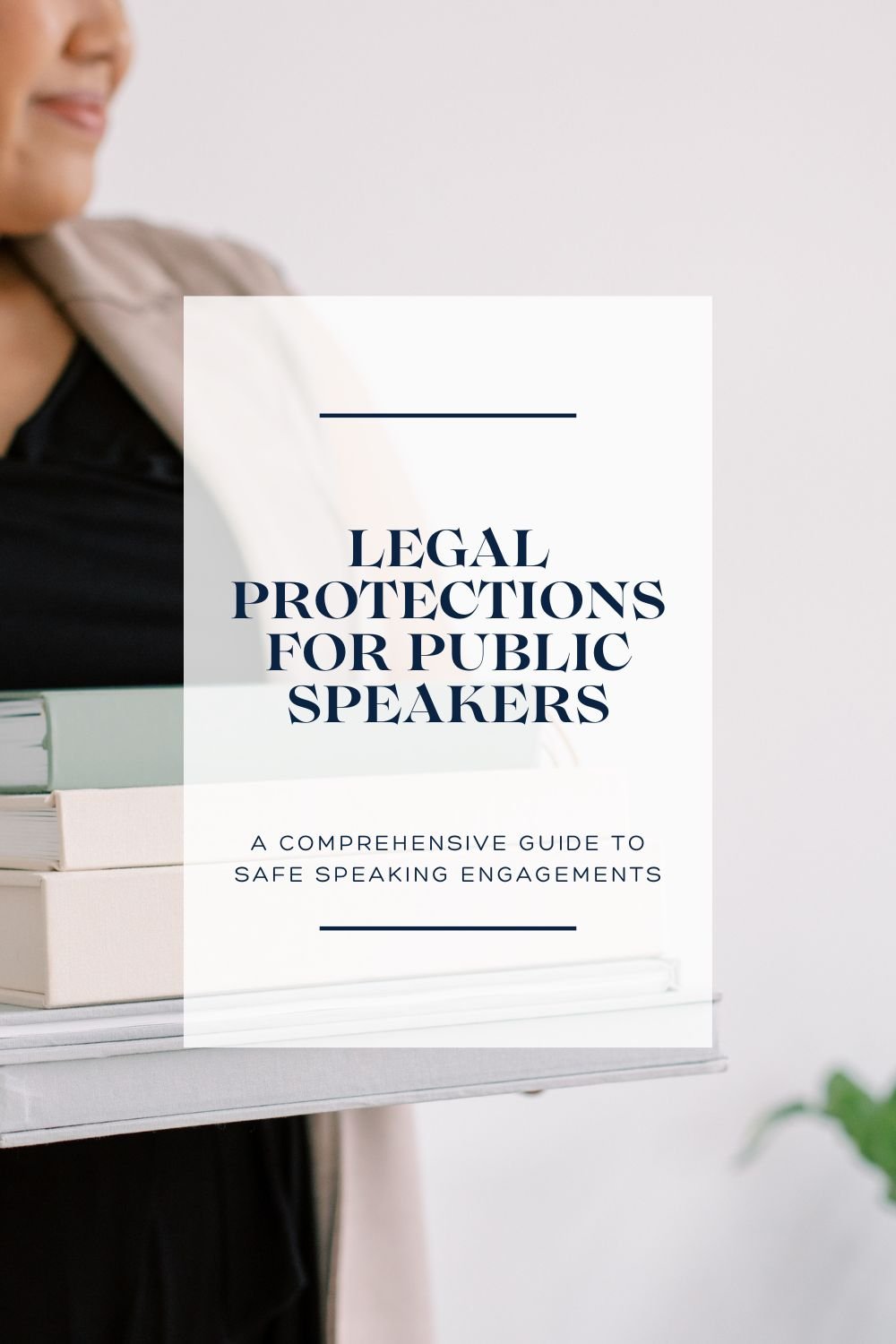How to Legally Use AI or Artificial Intelligence in your business
Hi there, dreamers & dynamos,
Welcome to How to legally use AI 101.
Let's dive into the ever-evolving world of Artificial Intelligence, or as we lovingly call it, "AI" and how to legally use AI in your business.
In essence, AI consists of sophisticated computer programs designed to imitate human intelligence. These programs can interpret and respond to prompts with a variety of outputs including text, visuals, or audio.
Online tools like Chat GPT, Simplified, and Copy.AI have quickly gained popularity among entrepreneurs for creating social media posts, graphics, and other content. They offer convenience and, when used correctly, are capable of producing impressive results.
However, it is crucial to consider some legal questions before completely adopting AI in your business operations.
But wait, before you dive headfirst into the AI pool, there are some key legal questions you ought to ponder.
How Can I Legally Use AI Content to Boost My Biz?
AI is a fantastic tool, but it shouldn't replace your genius. Instead, consider it as an efficient assistant that helps streamline your work. AI has the potential to reduce costs, eliminate creative blocks, aid research, and enhance overall productivity.
For instance, if you're a newbie and can't get the hang of social media postings, AI can help fine-tune your content by suggesting images, on-slide text, captions, and hashtags. It can even brainstorm a list of post ideas and write scripts for reels.
But take note, AI's your wingwoman, but remember, it doesn't replace your expertise.
How Can I Legally Use AI Content?
This is the question buzzing at the back of every entrepreneurs mind, or it should be if they are legally savvy (you're here, so you are definitely legally savvy! High-five!).
In short, yes, you may legally use AI for business. But like everything else related to legal the answer is also "it depends."
There are not laws that prohibit the use of AI for business and, in fact, we have all been using various forms of AI for many years.
So, what should you be concerned about? Let's look at some nuances to make sure you are using AI in way that is consistent with your biz's values and keeps you legally in the clear.
Can I OWN AI-generated content? Is it copyrightable?
This is a major question for any business owner. You are pouring your blood, sweat, and tears into your biz; you want to make sure that you actually own it so you can protect it. If your AI influenced content is fair game to all on the Internet, that's not going to work for you.
Love This Info? Check Out Related Articles:
What Has Been Copyrightable Pre-AI?
AI is a fantastic way to boost your business with top-notch content, but in the past, using someone else's words was called plagiarism and a huge legal no-no. Using someone else's writing, artwork, or audio content without their "okay" was copyright infringement. That's changing in the AI era.
Why? Well, AI generates content without a human author at the helm, which tweaks the copyright rules. You aren't actually using someone else's work, more of a something else's - a computer's work. The U.S. Copyright Office had to roll up its sleeves and make new rules for AI content.
The USCO's Approach to Copyright and Legally Using AI
In February 2023, they dropped the bombshell: AI-created artwork can't be copyrighted because there's no human input.
Copyrighted works must be the product of human authorship. This makes sense because a computer doesn't have ownership rights, only humans do.
The Copyright Office clarified this in response to a copyright registration involving a comic book with AI-generated artwork. The comic had narrative text and layout from a human (copyrightable) and images from AI (not copyrightable).
In a nutshell, the U.S. Copyright Office now emphasizes how much "human" contribution is needed for legit copyright registration. Is this all clear as mud? Are you reeling about how much is how much? It gets a little better so keep reading.
Hope for how you can legally use AI and obtain copyrights
Fast forward to March 2023, the Copyright Office tackled AI-generated text. They said the question of whether it can be copyrighted, depends on circumstances, like how much AI did the heavy lifting and how much the human author contributed.
This is also good content production sense. AI is not a human and can't know your biz or your dreamboat client's preferences as well as you can (yes, this is still true no matter how matter brand voice samples you provide). You should be editing and reviewing all AI content extensively for both accuracy and tone.
And just recently, the USCO launched their "Artificial Intelligence Initiative." This initiative says you must disclose AI contributions when seeking copyright registration. If you're registering content with even a pinch of AI involvement, you must be aware of this initiative and disclose your use of AI on your application.
Keep in mind, this does not bar your application, you can still get copyright but you must disclose the use or risk losing the copyright in the future.
Where we are in August 2023 on how you can legally use AI
A DC Court just agreed with USCO’s decision to deny copyright for works created by AI in Thaler v. Perlmutter. The Judge reasoned: “courts have uniformly declined to recognize copyright in works created absent any human involvement.” Which is very much keeping with the USCO’s Artificial Intelligence Initiative’s emphasis on weighing the amount of human contribution to a work.
So, can I legally use AI-generated content in my biz and still protect it?
So, yes, you can own content that uses AI and you may be able to copyright it. But it's a balancing act, and the majority of the work must come from your human brilliance.
Do I Need to License to Legally Use AI Content from AI Programs?
You are a super smart cookie to be asking that question and you definitely know your intellectual property ownership stuff.
Now that we have a handle on copyright and AI, we can look at licensing. Remember, licensing is the permission and terms that an intellectual property gives you for how to use their property.
You've got to delve into licensing terms from all AI programs. Most platforms that you've heard about grant a liberal non-exclusive license to use AI-generated content, like Open AI. Some may ask for credit in exchange for the license. Here, you need to be comfortable including an attribution on any content you use that their software helped to generate.
Bottom line: read those licensing terms before using AI content in your business. Plus, it's not exclusive, meaning other businesses who enter similar prompts might use the same AI-generated stuff.
That's why the human review and editing from you is crucial. Only you can make sure that your business stands out.
How to Stay Legally Sound with AI?
Never let AI take the place of your human touch. Actively edit and tweak anything AI generated that you plan to use in your business. This is both to help you obtain copyright and because the product will be unequivocally better for your human touch.
Second, you should definitely be disclosing your use of AI even if the platform's license doesn't require it. We see from the USCO's guidance that they require all content submitted for copyright to disclose AI influence. This is a bright line standard and best practice for you legally use of AI.
How should I legally disclose use of AI in my business?
Good news, you don't necessarily need to include it on every social media post, blog article, or newsletter - unless that is required by license provided from your chosen platform.
My recommendation for commercial use of AI is to include a disclaimer as part of your Website's Terms & Conditions. A simple clause like the one below may work well, but have your business attorney review and make sure it is right for your specific situation:
Sample AI-Generated Content Disclosure
At [YOUR BUSINESS] We value transparency and want you to understand how we create our content. This clause discloses the use of Artificial Intelligence (AI) in the content we produce, including but not limited to our social media content, website content, and various other materials.
1. How we Use AI Generated Content
We employ AI technology to enhance and streamline our content creation processes. This may include, but is not limited to, generating text, images, and other media using AI algorithms and tools. AI contributes to various aspects of our content, such as social media posts, blog articles, product descriptions, and more.
2. Purpose of AI Integration
The integration of AI in our content creation aims to improve the quality, efficiency, and relevance of the materials we provide to our audience. AI helps us in crafting engaging and informative content, but it does not replace the human creativity and expertise that goes into the final product.
3. Transparency and Authenticity
We are committed to maintaining transparency and authenticity in our content. While AI plays a role in content creation, it does not diminish the unique value we bring to our audience. We strive to ensure that all content, even when AI-assisted, aligns with our brand identity and values.
4. Consumer Awareness
We believe in empowering our consumers with knowledge about our content creation processes. By disclosing our use of AI, we aim to keep you informed about how we leverage technology to enhance your experience with our brand.
5. Your Feedback Matters
Your feedback is invaluable to us. If you have any questions or concerns about our use of AI in content creation or if you believe it affects your experience with our products or services, please don't hesitate to contact us. We appreciate your input and are always striving to provide the best possible experience.
Sidebar: If you use AI generation in order to provide client services like editing of photos, writing copyright, or graphic generation, be sure to put a variation of this clause directly into your client contract.
Key take away for legally using AI in your business
Remember, AI is new territory, and regulations are evolving. Use it as a tool, not a replacement for your creativity. And always keep it real and authentic – because that's what sets your content apart.
THIS ARTICLE IS NOT A SUBSTITUTE FOR LEGAL ADVICE AND IS OFFERED FOR INFORMATIONAL PURPOSES ONLY. EVERY SITUATION IS UNIQUE AND YOU SHOULD CONSULT A LOCAL ATTORNEY FOR ADVICE ON YOUR PARTICULAR CIRCUMSTANCES.






Learn to read the signs that it's time to part ways with a client and the legal steps to ensure a smooth transition. Dive into red flags, constructive alternatives, and a compassionate approach to ending a business relationship on positive terms.